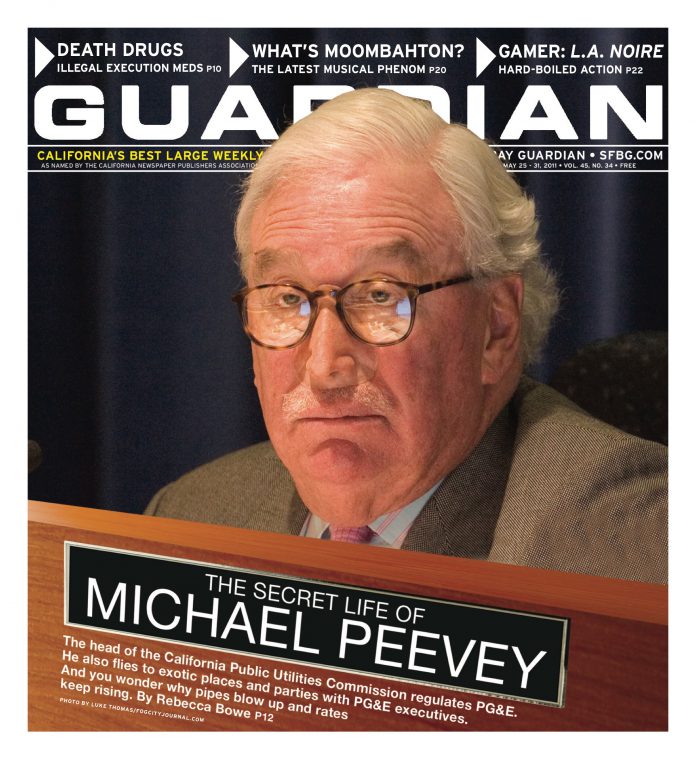tredmond@sfbg.com
The federal Drug Enforcement Administration is conducting a multistate criminal investigation into the actions that prison systems have taken to obtain a death drug no longer produced in the United States, documents obtained by the Guardian indicate.
The documents don’t reveal the specific targets of the investigation, but federal agents have seized drug shipments in Alabama, Georgia, Kentucky, South Carolina, and Tennessee and are apparently also looking into drug procurement policies in California, Arkansas, Alaska, and Arizona.
The states have been scrambling to obtain sodium thiopental, a drug used in executions, after the lone American manufacturer, Hospira Corp., stopped producing it last year.
Georgia and Arizona both received shipments of the drug from Dream Pharma, a British wholesaler that, according to the Associated Press, “shares a building with a driving school in a gritty London neighborhood.”
In October 2010, the California Department of Corrections and Rehabilitation sent agents on a secret mission to get some of Arizona’s supply. The agents drove under cover of night to the Arizona state prison in Florence, where at midnight the warden handed them 12 grams of thiopental, enough for an execution.
The state later ordered 521 grams — far more than the state could possibly use in the next few years — from Archimedes Pharma, also a British supplier.
Several other states, including Georgia, obtained the drugs from a different British supplier, Link Pharmaceuticals. According to the Associated Press, Nebraska’s supply was imported from India.
Most of the states imported the drugs without the proper DEA paperwork, a federal crime, the documents show.
Sodium thiopental is part of the three-drug mix used for lethal injections in most states that allow capital punishment. It renders the subject unconscious before the other drugs stop the heart and lungs from operating.
If the drug isn’t effective — that is, if it’s an improper formulation or an off-market product that doesn’t meet U.S. standards — the condemned inmate could suffer horrible pain, something the U.S. Supreme Court has made clear is not legally tolerable.
The drug isn’t often used in hospitals; it has been replaced by other drugs. And California had to put all of its executions on hold last fall when the state’s last batch expired.
The documents are the latest released as the result of a federal lawsuit filed by the ACLU of Northern California and the Guardian seeking access to all records related to the import of the death drug. Last week the DEA released 71 pages of documents, but withheld 160 pages, justifying the withholding by saying that some of the records are part of an ongoing criminal investigation.
A May 16 letter from Katherine Myrick, the DEA’s chief Freedom of Information Officer, states that there are “two active investigations” and that release of the records could “reasonably be expected to interfere with enforcement proceedings.” The documents reveal how desperately state prison authorities were trying to find a way to procure the drug — and how concerned the DEA was about importing a controlled substance by agencies that had no medical or research functions.
Among other things, they show that the Obama administration was taking an active role in the process: “The White House is involved and is trying to sort things out,” a Nov. 11, 2010 memo from the Office of Diversion Control states.
Another Nov. 11 memo notes that “states have been importing the lethal drug regimen from England … the U.K. has written the State Department (and the FDA?) asking the U.S. to end the importation of the drug, which is being used in lethal injections.”
A Nov. 9 memo notes that “FDA is concerned about importation of non-FDA approved sodium thiopental used for executions … Safety, efficacy and indication are FDA issues. So is the matter of off-label use (which was also brought up).”
The memo from the Liaison and Policy Office explains that the “DEA requires a valid DEA registration as an importer and a properly executed declaration in order to import controlled substances.”
A Nov. 12 memo confirms that “only two import declarations have been filed for sodium pentothal” — meaning that all the other states obtained their supplies illegally. The identity of the two states is blacked out.
Arizona has an execution date set for May 25, and Nebraska has an execution scheduled for June 14. But the documents are so heavily redacted, and so many pages are missing, that it’s impossible to tell exactly which states are doing what — and whether any of the upcoming executions would be using illegally obtained drugs.
“The DEA is making it impossible to know whether the states are complying with the law and whether DEA is fulfilling its obligation to enforce our nation’s drug laws,” said Natasha Minsker, death penalty policy director for the ACLU of California. “Importing sodium thiopental without informing the DEA is a crime. We now know the DEA was poised to go into the Arizona Department of Corrections and seize their drugs, as they did in Georgia, but for some unknown reason they did not. Why did the DEA seize drugs in some states but not others?”
Calls and e-mails to the California Department of Corrections seeking information on whether the department is the target of a federal investigation were not returned.

